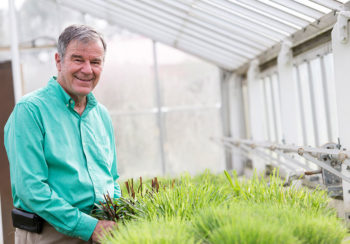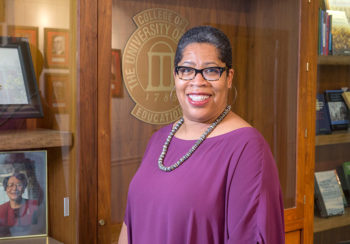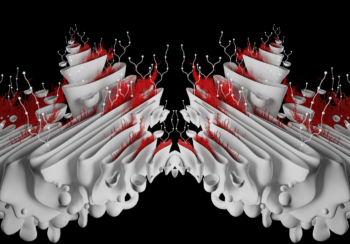Liza Stepanova’s story begins with a find at a Russian antique store. The find was an antique 19th-century piano, complete with built-in candleholders and engravings of famous composers. The finder was Stepanova’s grandmother, a World War II survivor who loved piano but whose circumstances had not allowed her to pursue music.
Stepanova was instantly taken with the piano as a young child, and her family arranged for her to have lessons near her grandmother’s house. At age 4, she sat down at the bench and played her first notes as her grandmother looked on. Everything about that instrument captivated her.
“That was the beginning,” Stepanova said. “My grandmother supported my playing from that first moment.”
Today an associate professor of piano in UGA’s Hugh Hodgson School of Music, part of the Franklin College of Arts and Sciences, Stepanova is making waves with bold international performances that combine her love of history, her commitment to retrieving untold stories and her belief in music’s power to address the present moment.
Stepanova won UGA’s Michael F. Adams Early Career Scholar Award in 2019 and the Creative Research Medal in 2021. She has performed throughout Europe and the United States, including as a soloist with the Southwest-German Philharmonic and in top international venues including Carnegie Hall, the Kennedy Center and the Berlin Philharmonic Hall. She won the Concert Artists Guild International Competition and received highest honors at the Coleman and Fischoff Chamber Music Competitions as a member of the Lysander Piano Trio.
Closer to home, she launched the Chamber Music Athens festival, which encourages collaborations among students, faculty and visiting performers. She has released two critically acclaimed albums, Tones and Colors (2018) and E Pluribus Unum (2020), the latter featuring piano works by diverse artists exploring the immigrant experience.
For Stepanova, who holds degrees from the Hanns Eisler Academy in Berlin and the Juilliard School, music is a shared language that connects us with the past and points us toward a more compassionate future. Although the coronavirus pandemic posed challenges to live music, performances now are back in full swing.
Despite the COVID-induced setbacks, Stepanova’s research has never faltered. She is working on multiple projects, each grounded in her understanding of composition and performance as windows onto history—and guides to help make sense of our present moment.
Revisiting Bach for 2022 and beyond:
Having lived and trained in Berlin for 11 years, steeped in the tradition of German music (especially Bach), Stepanova is returning to those roots—with a nontraditional purpose. She is in the process of learning the first book of Bach’s The Well-Tempered Clavier, asking how it might speak to our world today. Regarded as one of the most significant creations in European music for solo keyboard, this monumental work has been part of Stepanova’s musical DNA for 30 years, she said, but she’s still learning to hear what the music has to teach.
“I’d like to see how this timeless body of work could be connected with the present moment,” she said. “In the meantime, I’m learning the music.”
Stepanova’s work has frequently focused on themes of immigration. In this video, she performs “Rain Outside the Church” by Venezuelan-American composer Reinaldo Moya, a fellow Juilliard alum currently serving as composer-in-residence with the Chicago Philharmonic Orchestra. The drawings are by Syrian-Armenian visual artist Kevork Mourad, who also directed the video.
Retrieving the stories of women composers:
E Pluribus Unum, Stepanova’s 2020 CD, received attention for its emphasis on immigration, but it also made another statement by highlighting five women among the total of nine composers featured on the recording.
“We are fortunate to live in a generation where support for women artists is significantly stronger than earlier in history,” she said.
Stepanova has always had a strong interest in contemporary music, and the centerpiece of her new project is a newly commissioned work by Peabody Medal-winning American composer Libby Larsen. She is also researching the Baroque period, identifying women who wrote keyboard music as early as the 17th and 18th centuries.
“One of my recital programs last spring paired harpsichord piano music by Anna Bon of 18th-century Venice with music for toy piano by Errollyn Wallen, a Belize-born contemporary British composer, and it was thrilling to find parallels between these musicians living worlds and centuries apart,” Stepanova said. “I am very interested in a musical conversation between women of the past and women of today.”
Music education during a pandemic:
In a third project—born of necessity but no less important—Stepanova is exploring how music can be taught and performed in a pandemic and post-pandemic era. Just as live performance was hit hard by the COVID-19 outbreak, so was the teaching of music.
“We had to learn new skills,” she said, “and think about how to translate teaching and performance into an online space.”
For Stepanova, who has been at UGA since 2015, the roles of professor and pianist enhance one another. She is proud of the reimagined field that took shape, with split-screen formats and students and faculty coming together to create community in new ways.
“We’re the only school in Georgia to offer a doctorate in piano performance,” she said. “The students are very international, very strong. And being able to walk across the plaza from my office to a nationally recognized performing arts center is amazing.”
She takes inspiration for her research from her students, mentoring them as they embark on a profession dedicated to the creative process. The journey is not always linear; when a pianist begins learning a composition, she doesn’t immediately know the outcome. For a time, she must proceed on instinct, curiosity and trust.
But the end result, if Stepanova’s performances are any indication, can be magic. Stepanova calls it the “invisible energy” that comes from performing in front of an audience.
It’s an accomplishment her grandmother lived to celebrate. Ekaterina Nikolayevna lived long enough to see her granddaughter step into her UGA position. In her final years, she watched Stepanova perform live at a concert in Chicago. It was a fitting culmination to the story of a young girl who loved an antique piano and the observant grandmother who encouraged her to make it her own.
When Stepanova sits down at the keys today, that history stays with her. When she plays, she plays for both.






